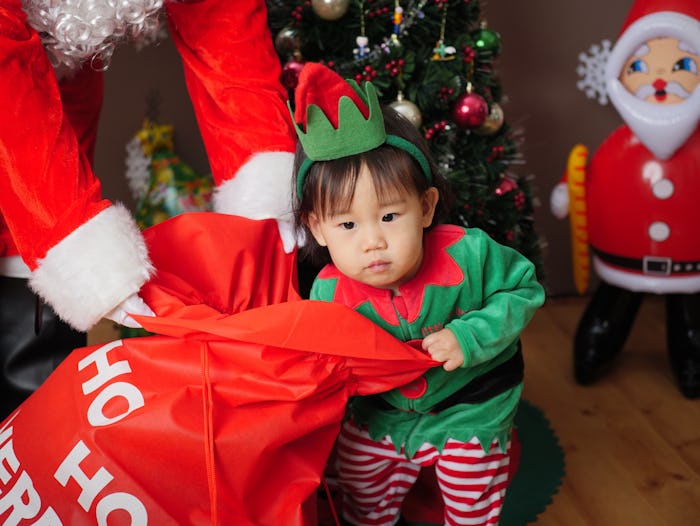If your kids are anything like mine, when they wake up on Christmas morning they rush over to the tree and immediately tear into their gifts with an overwhelming rush of excitement. I rarely stop watching to consider how many gifts kids can register getting, because they unwrap box after box with a seemingly never-ending stream of energy and enthusiasm. They rip open one gift, barely give it a second glance, and then tear into the next one. By the time they're finished, they probably don't even remember half of what they opened.
Over-gifting can have some unintended consequences for your children, as parenting expert Susan G. Groner tells Romper. She says that giving more gifts than your child can process "minimizes the value and impact of each gift," as opposed to gifting selectively where "even if they are little things, each one is most likely selected with love and thought." Additionally, she says that giving too many gifts "sets a level of expectation for years to come and can create an attitude of entitlement," and may even cause your child to confuse material gifts with love.
Plus, having an abundance of toys — whether in the form of Christmas gifts or otherwise — has been shown to decrease creativity. A 2017 University of Toledo study noted that "An abundance of toys present reduced quality of toddlers’ play," and "Fewer toys at once may help toddlers to focus better and play more creatively."
Although clinicians struggle to pin down an exact number of gifts that a child's brain can register at once, a study by the market research group Bjorklund and Bjorklund found that toddlers stayed engaged with a smaller number of toys longer than a larger number of toys. In the study, toddlers played with either three, 10, or 21 toys for 10 minutes. Because the toddlers stayed engaged longer with three toys than either of the higher number of toys, the researchers concluded that "the value of providing a great number of toys is highly questionable." So technically, your child doesn't need more toys. Research shows that they'll thrive just fine, if not better, with fewer toys.
What is truly important for kids is that they receive quality gifts over a large quantity of gifts. This doesn't mean the gifts have to be expensive. Quality can be measured in multiple ways. Time spent with your child is one example of a quality gift. Creating lasting memories that can impact them for years to come outweighs a plastic toy that will eventually end up in a landfill.
"What we think of as a 'quality' gift and something an adult would value can be lost on a child," Groner says. "For instance, real jewelry, an expensive guitar, or designer clothes. It’s important to remember that many kids may not give the gift the care and attention expected and that can cause conflict between the child and the gifter. Experiential gifts are my favorite. They can come in the form of trips, theater tickets, mani/pedi with mom, etc. But they can also be redeemable coupons for an afternoon of baking, an afternoon (or day or hour) of 'anything you choose,' ice skating with dad and some hot chocolate, trip to a bookstore and the book of your choice, etc."
In 2018, the American Academy of Pediatrics published a report about the benefits of non-electronic toys for kids. In a statement about the report, co-author and associate professor in the Departments of Pediatrics and Population Health at NYU Langone Health, Alan Mendelsohn, MD, FAAP, said, "The best toys are those that support parents and children playing, pretending and interacting together."
So, when selecting toys for your little ones, keep in mind that they may benefit more from a few meaningful toys that provide parent-child interaction than a mountain of gifts, of which they probably will lose interest in after a short amount of time.
Studies Referenced:
Dauch, C., Imwalle, M., Ocasio, B., & Metz, A. E. (2017, November 27). The influence of the number of toys in the environment on toddlers' play. Retrieved from https://www.sciencedirect.com/science/article/abs/pii/S0163638317301613.
Healey, A., & Mendelsohn, A. (2019, January 1). Selecting Appropriate Toys for Young Children in the Digital Era. Retrieved from https://pediatrics.aappublications.org/content/143/1/e20183348.
Bjorklund, Gall, Bjorklund, & Richard. (1979, January 1). An Exploratory Study of Toddlers' Satisfaction With Their Toy Environments. Retrieved from http://www.acrwebsite.org/search/view-conference-proceedings.aspx?Id=9584.
Experts:
Susan G. Groner, founder of The Parenting Mentor and author of the book, Parenting: 101 Ways to Rock Your World. Simple Strategies for Parenting with Sanity and Joy
